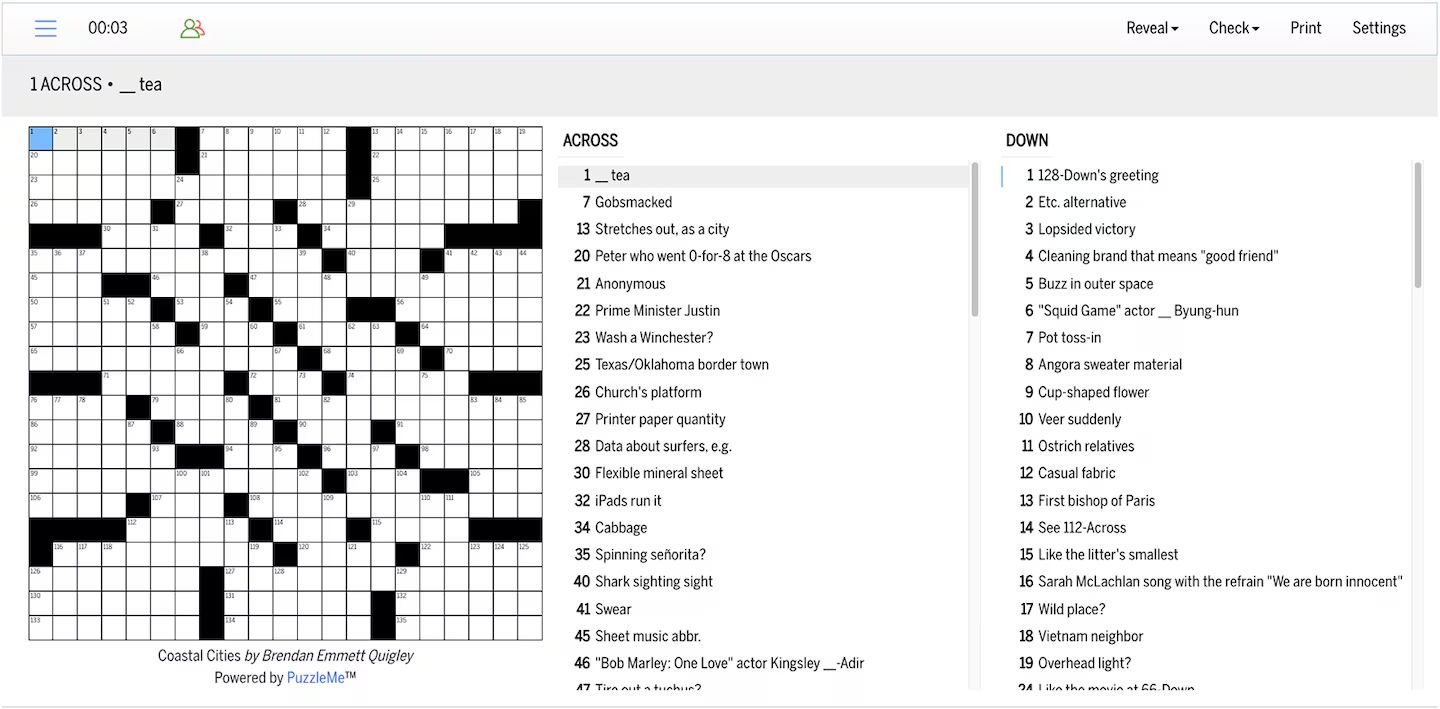In an era driven by rapid information, multitasking, and digital distractions, few activities offer the simple yet profound satisfaction of solving a Daily Crossword. Whether you’re enjoying your morning coffee, commuting on a train, or unwinding after a long day, this classic puzzle remains one of the most engaging mental challenges people turn to around the world.
The Daily Crossword isn’t just a hobby—it’s a cognitive workout, a stress reliever, and even a nostalgic reminder of newspaper culture. With millions indulging in the ritual every day, it’s more than just filling in boxes; it’s about learning, thinking creatively, and staying mentally active.
The History Behind the Crossword Puzzle
The crossword puzzle was first introduced to the public in 1913 by Arthur Wynne, a British journalist, in the New York World newspaper. His creation was a diamond-shaped word puzzle titled “Word-Cross,” which quickly evolved in format and popularity.
By the 1920s, crosswords had become a sensation. Major publications, including The New York Times, The Guardian, and Los Angeles Times, started featuring them. Over time, puzzles grew in difficulty, incorporated themes, and became cultural icons in their own right.
Why Do People Love the Daily Crossword?
The fascination with crosswords goes beyond mere wordplay. Here are some core reasons why people religiously solve their Daily Crossword:
Mental Stimulation
Solving puzzles activates various parts of the brain, including memory, logic, and vocabulary centers. It’s a great way to keep your mind sharp as you age, reducing the risk of cognitive decline.
Learning Tool
Even seasoned solvers encounter new words or cultural references. A Daily Crossword often introduces solvers to historical figures, rare idioms, literature, geography, and modern slang, making every session a learning experience.
Stress Reduction
There’s something inherently meditative about focusing on a puzzle. It provides a moment of quiet amidst the chaos—a way to disconnect from the hustle and re-center your thoughts.
Sense of Accomplishment
Filling in that last square gives an immediate, tangible sense of achievement. For many, that feeling is a daily dose of confidence and satisfaction.
Where to Find a Daily Crossword Today
Thanks to digital platforms, you no longer have to wait for the morning paper. There are dozens of websites and apps offering fresh puzzles every day. Here are a few of the most popular sources:
The New York Times Crossword
Considered the gold standard in crossword puzzles, the NYT Crossword gets progressively harder throughout the week. Monday puzzles are the easiest, while Saturday is the most difficult. Sunday puzzles are larger and often themed.
LA Times Crossword
The Los Angeles Times Crossword is known for its accessible and balanced difficulty. It’s widely syndicated and beloved for its clever cluing style.
The Guardian Quick & Cryptic Crosswords
The Guardian offers both “quick” and “cryptic” styles. The cryptic version, particularly, is a favorite in the UK, requiring wordplay and deeper logic to decode clues.
Daily Crossword Apps
Apps like Crossword Unlimited, Puzzazz, NYT Crossword App, and Redstone Games Crossword Puzzle bring crosswords to your smartphone with daily updates and difficulty scaling.
What Makes a Great Daily Crossword Puzzle?
Not all puzzles are created equal. A high-quality Daily Crossword typically follows a few key principles:
Fair Clues
A good puzzle avoids obscure trivia with no hints. Even when the answer is tricky, the clues should lead the solver logically to it.
Smooth Fill
No awkward abbreviations, crosswordese, or contrived words. The fill should be natural and pleasant to read.
Clever Themes
Some puzzles come with themes—hidden messages, visual patterns, or related clues that tie the whole puzzle together. Themed puzzles provide extra delight for advanced solvers.
Cultural Balance
Great crosswords feature a mix of old and new references, catering to solvers from different backgrounds, ages, and cultures.
Tips for Solving the Daily Crossword Like a Pro
Want to up your crossword game? Here are some proven strategies:
Start with the Easy Clues
Fill in the blanks and short answers first. These are often simpler and can help build momentum for tougher clues.
Use Crosswordese Wisely
Certain words pop up repeatedly in puzzles—like “Oreo,” “Erie,” or “Etna.” Recognizing these helps speed up solving.
Think About Wordplay
Clues with question marks often signal puns or wordplay. Try interpreting them both literally and figuratively.
Take Breaks
Stuck on a clue? Step away for a moment. Your brain often works on it subconsciously, and the answer may pop into your head later.
Practice Makes Perfect
The more puzzles you solve, the better you get. Over time, you’ll develop pattern recognition and learn a broader vocabulary.
The Community Around the Daily Crossword
Crossword solving is no longer a solitary hobby. Communities have formed online and offline where enthusiasts discuss clues, share tips, and even co-create puzzles.
Crossword Blogs and Forums
Sites like Rex Parker Does the NYT Crossword or Diary of a Crossword Fiend provide commentary and reviews of puzzles. Reddit’s r/crossword community is also active with discussions, spoilers, and memes.
Tournaments and Competitions
Events like the American Crossword Puzzle Tournament (ACPT) attract top solvers from around the world. Watching them race through a puzzle in mere minutes is a sight to behold.
Puzzle Creation Communities
More and more puzzle constructors are getting recognition for their work. Creating a Daily Crossword requires not just creativity but also rigorous editing and test-solving to maintain standards.
The Modern Appeal of the Daily Crossword
Despite the rise of fast-paced social media, TikTok reels, and short-form content, the Daily Crossword holds its ground. Its enduring popularity speaks volumes about the value of thoughtful engagement.
In fact, solving crosswords may be more relevant than ever. With concerns about screen time, attention spans, and mental health, the calm and concentration a crossword requires can be a welcome break.
Crosswords are also evolving to be more inclusive. Modern puzzles now incorporate diverse names, pop culture references, and contemporary topics, making them relatable to a younger audience.
Challenges in the Crossword World
Even with its rich tradition, the crossword industry faces its fair share of challenges:
Cultural Bias
Some puzzles reflect outdated or Western-centric knowledge bases. Editors and constructors are working hard to diversify content and include more global perspectives.
Accessibility
Not everyone finds crossword clues intuitive. Beginners may feel discouraged if the difficulty is too steep. The solution lies in offering graded difficulty levels and clue explanations.
Spoilers and Cheating
With answers posted online daily, it’s easy to “peek.” But for many, the joy lies in solving unaided—even if it takes a while.
How the Daily Crossword Enhances Daily Life
Let’s not underestimate the personal value a Daily Crossword brings. It structures time, adds intellectual delight to the mundane, and fosters a sense of routine.
Whether you’re 18 or 80, the benefits remain the same. A few minutes with your favorite crossword can make your coffee break feel like a victory. It’s one of those small habits that compound over time—boosting memory, logic, and even emotional well-being.
Some families even bond over solving puzzles together, turning it into a communal ritual. Others use it as part of their self-care routine, a peaceful retreat from a noisy world.
Conclusion:
The Daily Crossword is far more than black-and-white squares filled with letters—it’s a daily mental adventure, a language lover’s playground, and a loyal companion through the seasons of life. Its combination of challenge, education, and entertainment ensures that this puzzle will never go out of style.
Whether you’re solving it solo with a pencil or digitally on your commute, the crossword continues to be a simple yet profound way to start your day with purpose. So pick up today’s puzzle, fill in that first blank, and let your mind dance across the grid.
FAQs
1. Is solving the Daily Crossword good for brain health?
Yes, regularly solving crossword puzzles can help improve memory, vocabulary, and cognitive function. It’s especially beneficial for older adults looking to keep their minds sharp.
2. What’s the best app for solving Daily Crosswords?
Some popular apps include the NYT Crossword App, Redstone Crossword, and Crossword Puzzle Free. Each offers a different experience and difficulty range.
3. Are there themed Daily Crosswords available?
Yes, many publishers offer themed puzzles on holidays, pop culture, or historical events. These often add an extra layer of fun and challenge.
4. What’s the difference between a quick crossword and a cryptic crossword?
Quick crosswords use straightforward clues. Cryptic crosswords, more common in the UK, use wordplay, anagrams, and hidden meanings for a more complex challenge.
5. How long does it take to solve a Daily Crossword?
Times vary depending on the puzzle’s difficulty and the solver’s experience. A Monday NYT puzzle might take 5–10 minutes, while a Saturday could take over 30 minutes or more.




